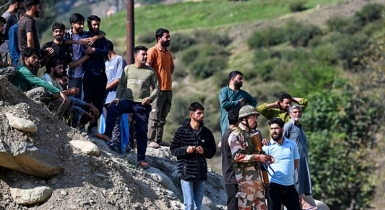
Under the changed global scenario, South Asean leaders stress more on going beyond centrality to mediate tensions, without being seen as against either side, as countries in this vast region can hardly afford to end up a graveyard of China-and US-backed military misadventures. It does imply, that for the first time, a majority of the countries in Southeast Asia favour alignment with China over the US. This is the main focus of the survey of the Institute in Singapore, namely : “The State of Southeast Asia 2024” the focal point of which based on considering the complicated global scenario emerged centering 'Palestine-Israel War' Though, the survey’s accuracy in reflecting mass opinion has been questioned, given its elite group of government officials, researchers, pundits and businessmen. But it still has to offer valuable insights for leaders in the United States, China and especially ‘The Association of Southeast Asian Nations’ to comprehensively reexamine the underlined positive diplomatic approach to conclude the views,according to analysts. The central point of ASEAN methodology mainly suggests that, in order to keep the Asean region safe and prosperous, they need to ask the US and China to respect the bloc’s centrality as a better means to
survive. Because, the Asean must be pro-China and pro-US in different ways, but not seen as against either side. After all, they must stress
upon the gravity of keeping some Asean members under domestic pressure, but not to possess the luxury of avoiding a choice.
The annual survey specially focused upon South Asian countries shall have to help improve upon balanced relations with the superpowers.For China, although it was favoured over the US by one percentage point,
the region’s distrust of Beijing also ticked higher. This is
unsurprising given the SOUTH CHINA SEA TENSIONS, as such fewer would
rightly choose to align with the US over China. With that end in view, the survey is also likely to be a reflection of a growing disapproval of the US, whose pro-Israel stance in the Gaza war has made it extremely unpopular in Muslim-majority countries. The
consumers in Indonesia and Malaysia, for instance, the companies have boycotted products seen as pro-Israel. As a matter of fact, “Free Palestine” rally stands near the US embassy in Kuala Lumpur, Malaysia. Thus the harsh reality is that Asean members do not get to pick who they would most like to work with. Japan, for instance, is well and away the most trusted major
power but Asean clearly needs China for economic growth, and the reverse might also be true.
Asean also needs US security support as Beijing has been ramping up its action in the South China Sea while there have been few breakthroughs in negotiations on a code of conduct in the sea. The Philippines, a long-time US defence ally, has even tried to rally support for a seperate code of conduct with Malaysia and Vietnam,
bypassing China.
Asean is at the forefront of the US’ efforts to preserve its global
dominance through China containment strategies so it is more than happy to provide military support to its regional treaty allies. Even Malaysia and Indonesia, for all the harsh rhetoric about US hypocrisy in the Gaza war, are unlikely to shy away from seeking US support to defend their territory.
In the absence of territorial disputes with China, the Asean region would be likely to be staunchly pro-China, given the massive trade benefits. When China feels its core interests are being threatened, it tends to employ economic sanctions, and when China withdraws its trade, the US-led West struggles to fill the gap – as seen with Lithuania and Australia.
But the coercion also has the effect of pushing “punished” countries closer to the US. Australia, for instance, has deepened military cooperation with the US through the Aukus alliance (which also includes Britain), irking China even more.
The Philippines has also drawn closer to the US as disputes with China grow in the South China Sea. The US’ operations in the area are usually conducted under the banner of “freedom of navigation”.
Relations between the US and China appear to be stabilising, with US Treasury Secretary Janet Yellen recently visiting China, but core differences remain and both sides can be expected to continue to aggressively advance their interests in Southeast Asia.
Despite both China and the US officially endorsing Asean centrality, the reality is that a strong and unified Asean should favour neither.
To maximise their interests, it will always be easier for superpowers to divide and conquer by singling out friendlier states. Asean leaders must not be naive and must explore ways to diffuse US-China tensions as a collective strategy.
Asean cannot and must not expect to reap the benefits of US-China rivalry – such as from companies reshoring out of China – without being prepared to pay the price should the rivalry spiral out of control.
From Beijing's perception, reshoring, “friendshoring” and “de-risking” are all forms of “decoupling” in disguise, aimed at weakening China. Beijing may not view Asean as an entirely innocent bystander that just happens to profit at its expense. Unfortunately, however, for most Asean leaders, this seems to be their strategy, or lack thereof.
That said, there is still hope that Asean can mediate US-China
differences and reduce tensions. The Shangri-La- Dialogue, one of the world’s biggest defence diplomacy platforms, has been hosted in Singapore for more than two decades with increasing representation from China.
Singapore has also hosted leaders’ meetings credited with diffusing tensions, such as the first summit between Chinese President Xi Jinping and then Taiwanese president Ma Ying-jeou in 2015, and the historic summit between US president Donald Trump and North Korean leader Kim Jong-un in 2019, may be recalled in this regard.
Besides Singapore, all of Asean must promote the bloc as an honest broker and a neutral platform to seek solutions to the US-China rivalry. The last thing the region wants is to end up a graveyard of China- and US-backed military misadventures.
In the context of the sudden change of global order, countries concerned need to keep in their sky-mind that " It is time for Asean visionary leaders to realise that security comes not from passive centrality but from active mediation". With that end in view, at this time, the present World order can in no way afford to go for another mighty World War like situation like 1914 and 1945 in the best
interest of world peace necessitated for human civilisation.
The writer is a Senior Journalist and Media Analyst, writes mainly on
Promoting Knowledge Based Society, Socio-Economic Transformation,
Climate Change, Rule of Law, Human Rights & Good Governance





































